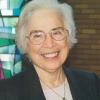Mary Magdalene has gotten a lot of bad press, it seems to me. I agree with James Carroll that her image has been repeatedly "conscripted, contorted and contradicted." Every July 22, on her feast day, I dread listening to homilies at church; in Scripture study groups, I shudder at the accusations against her.
According to the New Testament, who was Mary Magdalene?
Mary was a common name in New Testament times, held by a number of women mentioned in the canonical Gospels. The commonly received and traditional history of Mary Magdalene by Catholics and other Christians has been greatly affected by different interpretations about which biblical references actually refer to her beyond those where she is identified by the place name (referred to as a toponym) "Magdalene."
In the Gospels, several women come into the story of Jesus with great energy. There were Mary, the mother of Jesus, and Mary of Bethany, sister of Martha and Lazarus (Luke 38-42 and John 11). Also, we read about Mary, the mother of James and Joseph, and Mary, the wife of Clopas.
Some women have erotic energy, like the three unnamed women who are expressly identified as sexual sinners, and they, too, have become part of the legend: the woman who wipes Jesus' feet with ointment, a Samaritan woman whom Jesus meets at a well and invites to seek her "husband," and an adulteress whom Pharisees haul before Jesus to see if he too will condemn her.
All of these Marys make it difficult to unravel the tapestry of Mary Magdalene from the knotted threads of legends about her that have been passed on from generation to generation.
In the four Gospels, Mary Magdalene is nearly always distinguished from other women named Mary by adding "Magdalene" (μαγδαληνή) to her name. Traditionally, this has been interpreted to mean she was from Magdala, a town thought to have been on the western shore of the Sea of Galilee. Luke 8:2 says she was actually "called Magdalene." In Hebrew, מגדל or Migdal means "tower" or "fortress," and in Aramaic, "Magdala" also means "tower" or "elevated, great, magnificent."
The real Mary Magdalene of the Gospels actually fits well with the mission and identity of many socially committed people of today: She knew about service to others and engaging other disciples to "come and see" the human needs they might witness. She knew about inclusion; she knew about friendship; she knew about fidelity even when life looked desolate.
For Mary Magdalene was a faithful friend of Jesus:
- as one who hung in — according to the Gospels — during Jesus' public ministry as one of his disciples (Luke 8:1-2, Mark 16:9);
- as a witness at the foot of the cross during the crucifixion (Matthew 27:56, Mark 15:40, John 19:25);
- as one of the women who brought spices to anoint Jesus at the burial site (Matthew 27:61, 28:1; Mark 16:1);
- as a witness who found the tomb empty after the Resurrection (Matthew 28:1, Mark 16:9, Luke 24, John 20:1);
- and as the first apostle to report the Resurrection to the rest of the disciples after Jesus' private appearance to her (John 20:16, Mark 16:9, Matthew 28:9).
Mary Magdalene was not afraid to be a faithful friend! No matter what the personal cost.
The deep sacrificial friendship that Mary Magdalene had for Jesus has not only been intertwined with the many "Mary" stories of Christian history, but it has also been misinterpreted, calling her the secret wife of Jesus and claiming that Jesus (calling him Joseph) and Mary Magdalene (referred to as Aseneth) were parents of Ephraim and Manasseh.
Other speculative as well as rather sad fictions have been written about the relationship between Jesus and Mary Magdalene. Sometimes we too judge close friendships harshly or at least suspiciously, so this may be understandable. Perhaps there is a lesson to learn here from Mary Magdalene's long-lasting friendship with Jesus. Deep and lasting spiritual friendships allow us to serve as disciples, to pray together, to witness suffering, to share whatever joys and sorrows life has to offer, and to rejoice at Resurrection!
I have always loved Chapter 6:14-17 of the Book of Sirach (Ecclesiasticus) on true friendship:
A faithful friend is a sturdy shelter; the one who finds such, finds a treasure.
A faithful friend is beyond price; no sum can balance his [sic] worth.
A faithful friend is a life-saving remedy; such as he who fears God, finds
For the one who fears God behaves accordingly; and one's friend will be like oneself.
Maybe we need to remember often, and even imitate, the real Mary Magdalene, one who had the privilege of calling Jesus "friend."
[Cecilia A. Ranger is a Sister of the Holy Names of Jesus and Mary. She is now retired at Mary's Woods in Lake Oswego, Oregon, where she does some teaching, parish or personal retreats, and writing.]

